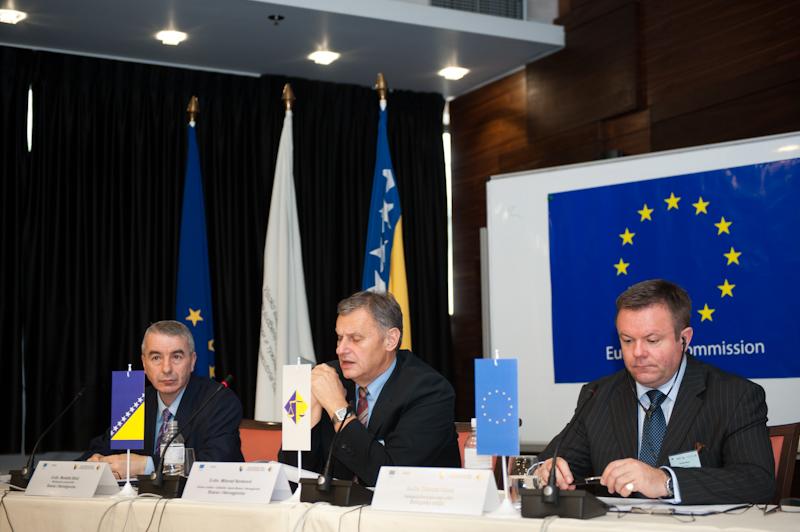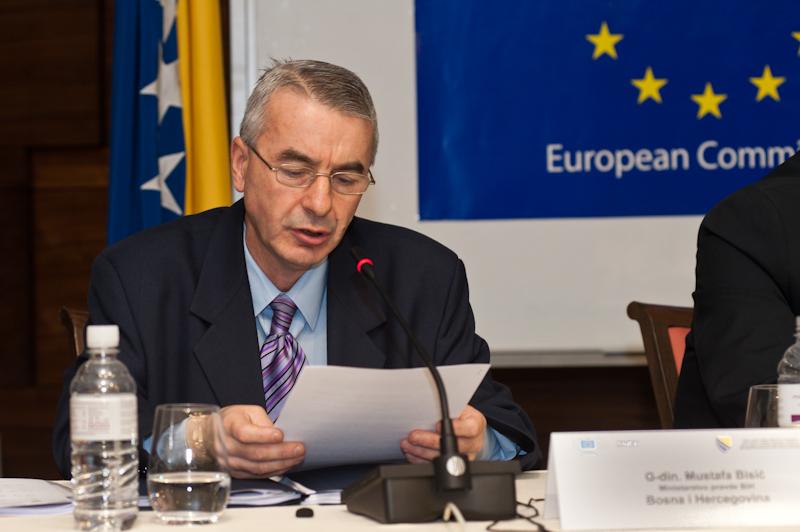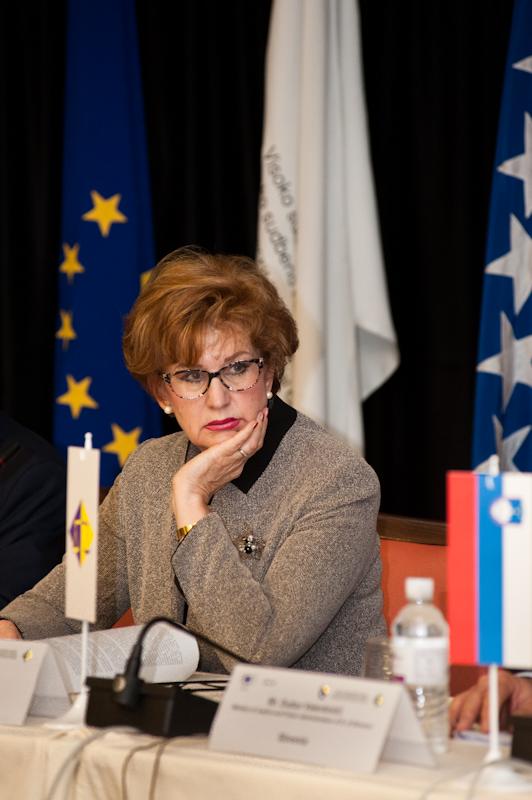Regional conference “Exchange of Experiences on Execution of Criminal Sanctions” that was organized by the High Judicial and Prosecutorial Council of Bosnia and Herzegovina (HJPC BIH) in cooperation with the Technical Assistance and Information Exchange Instrument (TAIEX) of the European Commission was held on 30 November 2012 in Sarajevo.
The aim of the Regional Conference was the exchange of experiences in backlog reduction in the courts, related to execution of criminal sanctions. Due to different circumstances that make execution of criminal sanctions difficult, the intention of the organisers was to enable exchange of experiences in overcoming obstacles for establishment of a functioning system of execution of criminal sanctions, which was the subject matter of a recommendation issued in conclusion to the second meeting of the Structured Dialogue on Justice between the European Union and Bosnia and Herzegovina held on 10 and 11 November 2011.
In his introductory speech the President of the HJPC BiH Milorad Novkovic pointed out that, despite the relatively good results in the work of the criminal departments of the courts in Bosnia and Herzegovina, the BiH judiciary was faced with “objective obstacles in handling cases related to the enforcement of criminal sanctions,” and that the exchange of experiences at the conference would “contribute to finding constructive solutions to this problem faced by all countries to a greater or lesser extent. “
Richard Wood, Head of the Home Affairs and Public Security Section at the Delegation of the European Union to BiH/EUSR emphasized that “a functional and efficient system of execution of criminal sanctions is paramount for this country, or any other country in the region looking to become a member state of the European Union”.
Mustafa Bisić, Deputy Minister of Justice BH in his introductory remarks referred to the existing problem and the efforts of the Ministry of Justice to overcome negative occurrences in the execution of criminal judgments of the Court of Bosnia and Herzegovina through laws and regulations, and through cooperation of state and entity ministries of justice.
During the Conference participants had an opportunity to hear about the experiences in the execution of penal sanctions between courts and prison administration from representatives of Republic of Slovenia, about the experiences in this area in Bosnia and Herzegovina and experiences and results in execution of criminal sanctions in Croatia, Serbia and Montenegro.
Speakers at the Conference were Igor Bele, Head of Sector for Execution of Penal Sanctions Ministry of Justice and Public Administration of Republic of Slovenia, mr.sci.. Dušan Valentinčič, Director General of the Slovenian Prison Service, Meddžida Kreso, President of the Court of Bosnia and Herzegovina, Mustafa Bisić, Assistant Minister, BiH Ministry of Justice, Zvjezdana Šimundić, Head of Department for monitoring and securing of prisoners rights, Ministry of Justice of Republic of Croatia, Jana Špero, Ministry of Justice of Republic of Croatia, Prison Administration, Milan Stevović, Director of Directorate for Execution of Criminal Sanctions, Ministry of Justice and Public Administration of Republic of Serbia, Slavica Rabrenović, Assistant Minister of Justice and Human Rights of Republic of Montenegro.
Following conclusions were adopted at the end of the Conference:
1) It is necessary to improve accommodation capacities of prisons and institutions for implementation of security measures, as well as improving conditions in the correctional institutions in order to ensure protection of prisoners rights which will lead to reduction of lawsuits for breach of human rights.
2) It is necessary to harmonize legislation in area of execution of criminal sanctions, which would lead to improvement of the system and to reduction of the work load of courts and correctional institutions.
Positive experiences from the countries from the region and EU member countries should be taken into consideration in the process of harmonizing legislation.
3) It is necessary to improve the legal and institutional framework regulating storage and managing of ceased items during and after criminal procedure before court.
4) It is necessary to improve cooperation between courts and correctional institutions.
5) Continue with the exchange of experiences in area of execution of criminal sanction through organizing conferences and in other suitable ways (for example web forums).
6) It is necessary to improve legislation regulating out-of-institution execution of criminal sanctions, with regard to improving the status of victims of crime
TAIEX is the Technical Assistance and Information Exchange Instrument of the Directorate-General for Enlargement of the European Commission designed to support countries with regard to the approximation, application and enforcement of EU legislation. More information is available on http://ec.europa.eu/enlargement/taiex.












